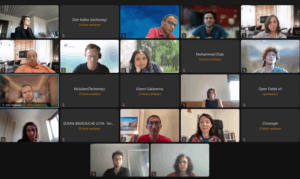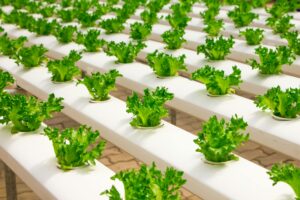The PRIMA WEFE Nexus Award 2023 winners were announced today at the Sitges co-creation workshop for the ideation of the WEFE Nexus community of practice. Recognizing groundbreaking solutions for water, food, and energy in the Mediterranean, this award underscores the need for collaboration. It honors researchers and practitioners fostering a holistic approach for sustainability, going beyond sectoral boundaries. The criteria emphasize societal benefits, solution uptake, and replicability. The aim is to inspire a shift towards a more interconnected and sustainable future, setting standards for development practices in the Mediterranean and beyond.
Meet the two winners now!

Christelle Bou Harb receives PRIMA’s WEFE Nexus Award for pioneering community-based solutions in Lebanon
Lebanon is facing severe challenges with food insecurity, where poor resource management significantly contributes to the issue. Recognizing the urgency for a Water-Energy-Food-Ecosystem (WEFE) approach, Christelle Bou Harb, from the Environment and Sustainable Development Unit (ESDU) at the American University of Beirut, has been recognized by PRIMA with the WEFE Nexus Award. Her innovative approach aimed at community-driven solutions to alleviate food scarcity in Lebanon stood out, demonstrating a holistic and practical method for addressing this crisis.
This approach, deployed by the ESDU, revolves around a unique concept – the ‘living lab’. These are experimental public areas managed by real-time users, encouraging a two-way flow of information and an environment that thrives on participatory community engagement. This intervention method is backed by a four-step approach designed to facilitate sustainability through local practices.
The living labs have made a noticeable impact, primarily addressing climate change effects on rangelands for livestock keepers in 3 different Lebanese areas. Barley sprouting, the focal point of this approach, has proven effective in boosting livestock health, production, and overall economic resilience, significantly benefiting 75 farmers. The experiment showcased substantial economic gains such as an astonishing reduction in energy costs (75-100%), increased production and sales (30%), and enhanced livestock health.
In addition to the economic gains, these living labs aim to contribute to social and economic growth in the Mediterranean area. The process is participatory and built upon Systems Thinking, allowing the community to actively engage in the project from inception. The strategy not only equips the community with critical problem-solving and systems evaluation skills but also fosters gender equity by engaging women in facilitator roles. Moreover, these initiatives foster community networking, generate economic independence, and have effectively served as models of good resource management and sustainability. The economic sustainability of these initiatives also plays a significant role in encouraging communities to adopt these practices.
The success and the local adaptability of these living labs have shown a 70% adoption rate, underlining their potential for replication and scaling. This cost-effective and self-sustaining approach, accompanied by active community participation, not only ensures the success of the living labs but also serves as a model for replication across similar communities. ESDU is working closely to document and share the scientific impact of these labs, thus encouraging other organizations to adopt similar models for socioeconomic and environmental development.
Christelle Bou Harb’s exemplary work stands as a testament to the power of community-based sustainable solutions and has set a benchmark for addressing critical issues through innovative, community-driven strategies.

Afonso Dominguez Padilla Awarded for SUPROMED – A Game-Changing Agroecosystem Platform
SUPROMED, the PRIMA project coordinated by Afonso Dominguez Padilla (University of Castilla la Mancha), has been honored with the WEFE Nexus Award from PRIMA for its contributions to the sustainability and efficiency of Mediterranean agroecosystems.
The project’s vision and efforts have led to the development of an online platform that introduces models and methodologies for optimizing resource usage – water, energy, fertilizers, and land – in agriculture. The tools offered by SUPROMED encompass diverse features, ranging from enhancing irrigation scheduling, evaluating water and nitrogen status, to designing more efficient irrigation systems. This platform was tested and validated across three demonstration areas in Spain, Lebanon, and Tunisia and successfully adapted for use by farmers and agricultural technicians.
To begin, a detailed comparison was made between traditional agricultural management and SUPROMED-led approaches across the three demo sites. Notably, the SUPROMED techniques demonstrated marked improvement across various key performance indicators (KPI), ensuring increased profitability and reduced environmental impact compared to traditional methods.
The success of SUPROMED has not gone unnoticed by public administrations in Spain and Tunisia, leading to the signing of agreements with regional and national governments, illustrating its vast socio-economic potential in driving employment and growth. Additionally, private enterprises like Coopaman and Alcaliber have engaged with SUPROMED for adapting irrigation scheduling tools, further signifying the wide-scale adoption and commercial relevance of this innovative platform.
SUPROMED’s proactive approach ensures the active involvement of end-users. Through 63 dissemination and training events conducted over two years, SUPROMED directly engaged over 2,200 participants, including farmers and technicians. Notably, extensive participation in workshops and conferences underscores the deep interest and commitment of the agricultural community to incorporate and adapt SUPROMED methodologies for their own farms.
The platform’s success is further evident in its scalability and replicability, illustrated through the interest of public and private stakeholders, and the increasing number of users engaged in this transformative agricultural solution. Its affordable, practical, and adaptable solutions, be it irrigation scheduling tools or crop distribution analysis, signify its feasibility for replication across Mediterranean agroecosystems.
SUPROMED platform sets a new benchmark in the agricultural domain, showcasing an innovative, practical, and transformative approach for sustainable and efficient farming practices in the Mediterranean area. The recognition from PRIMA serves as a testament to the platform’s remarkable achievements and its potential for wide-scale adoption and continued impact.



